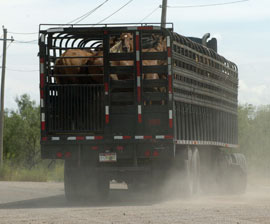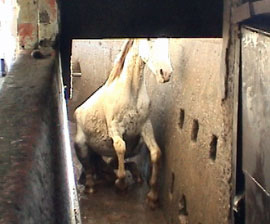Senate Moves to End Slaughter
By Paula Parisi June 16, 2011Lawmakers are rallying to keep horses off dinner plates. Backed by 16 senators, the “American Horse Slaughter Prevention Act of 2011” was introduced June 9. The bill, S. 1176, would explicitly outlaw the killing of horses for meat in the U.S and prohibit the transport of horses to Canada and Mexico for slaughter.
With bi-partisan support led by sponsors Sen. Mary Landrieu (D-La.) and Sen. Lindsey Graham (R-S.C.), horse advocates are hopeful the third time’s a charm for the legislation, which has in various forms languished in committee through congressional sessions dating to 2005.
Though the last U.S. horse slaughterhouses were shuttered in 2007, the closures were the result of indirect rules, including environmental strictures and government defunding of horse meat inspections. Although Texas and Illinois enacted state bans, the butchering of horses per se was not addressed at the federal level.
The end result is that U.S. horses continue to be exported to Mexico and Canada for slaughter. An estimated 100,000 horses are purchased annually in the U.S. at auction by “killer buyers” on contract with foreign companies, mainly in Europe, where horse meat is prized as a lean alternative to beef.
Aside from the cruelty issues, opponents of horse slaughter argue that U.S. horses are not raised under food safety standards, and routinely ingest prohibited substances– including steroids and de-wormers–that make them unsuitable for human consumption. (In a move considered a blow to North American slaughter industry, the European Union last year passed a law requiring veterinary proof that horses destined for consumption were free of banned substances for six months prior to death.)
Animal rights groups including the American Society for the Prevention of Cruelty to Animals (ASPCA) applauded the introduction of S. 1176. “Horses purchased for slaughter suffer incredible abuse even before they arrive at the slaughterhouse,” ASPCA senior vp government relations Nancy Perry said in a press release. “Americans have a responsibility to protect these intelligent, sensitive animals from being butchered. Horses are a historically significant part of American culture and deserve a more dignified end to their lives than to be inhumanely slaughtered and served at European cafes.”
The ASPCA release went on to describe slaughter-bound horses as “transported long distances–often more than 24 hours at a time–in cramped conditions without food, water or rest.” It further states “the slaughter methods used on horses rarely result in quick, painless deaths, as they often endure repeated stuns or blows and sometimes remain conscious during their slaughter and dismemberment.”
The Humane Society of America says that using undercover cameras at Mexican slaughter plants it has “documented the use of the puntilla knife to stab horses repeatedly to paralyze them for butchering.”
Supporters argue that conditions in U.S. plants could be better controlled. They make the case that slaughter houses are a necessary, cost-effective way for owners to dispose of old, sick and unwanted horses, which they claim are growing in numbers as a result of the bad economy. Yet animal advocacy groups offer documentation that the majority of horses entering the food chain were in good health prior to starting their slaughter journeys, many of them ex-racehorses.
Montana and North Dakota have seen slaughter proponents pushing for state laws that would pave the way for local meat inspections and the opening of plants. So far, such efforts have failed under legal challenge.
“There is virtually no demand for horse meat in this country,” Senator Landrieu said in a printed statement. “However, tens of thousands of horses are inhumanely transported across our borders where they are brutally slaughtered. As a lifelong horse lover and rider, this practice is appalling to me, and more importantly, the majority of Americans oppose it. We raise and train horses to trust us, perform for us, and allow us on their backs, and as such, they deserve to be treated with human compassion. When horse owners are faced with the sad reality of having to put their animals down, it should be by humane euthanasia. I intend to work with Senator Lindsey Graham from South Carolina and my other colleagues to get this bill passed and permanently end the slaughter of our American horses.”
The bipartisan list of original co-sponsors of the bill includes: Daniel Akaka (D-Hawaii), Charles Schumer (D-N.Y.), Kirsten Gillibrand (D-N.Y.), Mark Kirk (R-Ill.), Barbara Mikulski (D-Md.), Mark Begich (D-Alaska), Thomas Carper (D-Del.), Frank Lautenberg (D-N.J.), Carl Levin (D-Mich.), Joseph Lieberman (I-Conn.), Robert Menendez (D-N.J.), Bernard Sanders (I-Vt.), Scott Brown (R-Mass.) and Susan Collins (R-Maine).
Though there have been many anti-slaughter amendments and bills introduced over the years, the last significant advance occurring in 2007 when the House of Representatives overwhelmingly passed the American Horse Slaughter Prevention Act, H.R. 249, only to see it die in the Senate.
Short URL: https://theequestriannews.com/?p=2563





